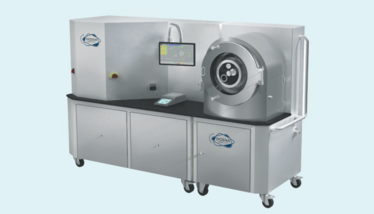
Designed With You in Mind
The best machinery can only be made with the input of the people who use it everyday
Michael Benjamin |
sponsored by Diosna
Before joining Diosna, I spent around a decade in various pharma manufacturers and CDMOs in Germany. As a pharmaceutical engineer, I’d always been fascinated with equipment and I really hoped that, one day, I could use my experience to help optimize those systems. When you are operating equipment on a day to day basis, shortcomings in the design quickly become apparent. I came to Diosna four years ago with a vision: simplifying the lives of people in the pharmaceutical industry.
The modular trend for CDMOs
Current trends across the pharmaceutical industry are moving towards specialized, highly potent drugs and smaller batch sizes. And that means pharmaceutical manufacturing equipment must be flexible, versatile, and modular. Many pharma companies choose to outsource some of their manufacturing operations so that they can primarily focus in-house resources on scientific research and marketing. And when medicines are made in smaller batches, it’s often advantageous to let a CDMO do the manufacturing work. For CDMOs, flexibility is even more crucial. CDMOs work with
a variety of clients and need access to diverse technologies – from traditional to cutting edge – to suit client demands. At the moment, modular equipment is a key trend, with a number of CDMOs requesting these types of machines.
The MINILAB RC and the MIDILAB RC are two examples of modular, plug and play machines that are particularly popular with CDMO customers. The MINILAB RC is designed for process development and is able to combine the main pharmaceutical technologies – drying, granulation, and tablet coating processes – using modules. Meanwhile, the MIDILAB RC combines high shear mixing, fluidized bed and tablet coating processes in one system. Where these capabilities might otherwise require four or five rooms, both of our systems are simple benchtop devices operated by a touchscreen. All you need is compressed air and a power supply – and then, wherever you are, you can directly start manufacturing. The exchanging of modules is done without any tools, and takes less than five minutes.
Within the modules is a range of bed sizes suitable for 40 g to 16 kg. With this range, you can operate many different batch sizes – and, in my view, this is exactly the type of technology that CDMOs need; the range gives them flexibility. Scale up is always a challenging process, and so being able to scale up using just one machine makes a significant difference.

Meeting real needs
Traditional pharma companies also value flexibility and modular machines – and the two systems mentioned above have been welcomed by pharma manufacturers as well. Aside from flexibility and modularity, however, there are other features that are important in good equipment:
- Hygienic design. The ability to easily and thoroughly clean the machine is key to reducing the risk of contamination. Ideally, cleaning should be automated.
- Process Analytical Technology (PAT). The FDA has encouraged the industry to use PAT to improve processes and efficiency. Optionally our machines incorporate PAT technologies, such as NIR spectroscopy for in-line humidity testing.
- Ease of operation. Inclusion of features like adjustable screens that enable operators to keep track of the process, while having the controls immediately at hand, make the lives of users much easier.
- Assembly. If the size of the machine permits it, there shouldn’t be any tools that require GMP approval for assembly or disassembly.
In our process lab, customers are given the opportunity to test our machines with their pharmaceutical products – with the guidance of our expert pharmaceutical engineers and operators. This not only provides practical training for the customer in terms of how the machine works, but is also a valuable opportunity for us to get feedback from the customer, which can be used to further improve our systems. We discuss what could be changed and what we could improve just to fit the demands of the customer. In this way, equipment can constantly evolve and advance.
It is often said that pharmaceutical manufacturers are very conservative – and sometimes reluctant to implement new technology. We often hear the phrase, “Well, we’ve always done it this way.” But I would encourage companies to use state-of-the-art equipment wherever possible – after all, it has been designed to get the very best out of your product.
Diosna will be exhibiting their range of machines, including the MINILAB RC and MIDILAB RC, at Interpack in Dusseldorf, 7–13 May 2020.
Michael Benjamin has more than 10 years of experience working in solid pharmaceutical development across a number of different pharmaceutical manufacturers, including one of the biggest CDMOs in Germany. He is currently Head of Pharmaceutical Laboratory at Diosna.
Michael Benjamin has more than 10 years of experience working in solid pharmaceutical development across a number of different pharmaceutical manufacturers, including one of the biggest CDMOs in Germany. He is currently Head of Pharmaceutical Laboratory at Diosna.



















